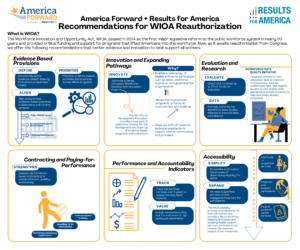Improving economic mobility is essential to strengthening families, communities, and our nation. But even as the demand for workers continues to grow, millions of people across the country still face systemic barriers to employment and economic opportunity, especially people in historically under-resourced communities. Providing new, innovative pathways into the workforce and reimagining outdated workforce development systems are critical steps towards advancing economic mobility for all, enabling people to thrive, and building a stronger, more equitable economy.
The Workforce Innovation and Opportunity Act (WIOA), our nation’s primary federal workforce development legislation, provides critical investments in programs that expand opportunities and build capacity for the American workforce. As the 118th Congress works on WIOA reauthorization, we have the opportunity to improve the effectiveness of the nation’s workforce system and address longstanding barriers to success.
America Forward and Results for America have proposed a set of solutions related to data and evidence that will shift WIOA programs towards an evidence-based, outcomes-focused orientation, while cutting down on red tape that stifles improvement efforts.
- Workforce Development Innovation Fund. Congress should authorize a tiered Workforce Development Innovation Fund to accelerate innovation and the scale-up of evidence-based workforce development strategies. Social innovators have developed a growing array of evidence-based workforce development programs that enable workers to build their skills and achieve sustainable careers in an array of sectors. However, the workforce development funding system does not target funding to the most effective programs or intentionally support the development of new models in response to evolving needs among workers and the labor market. This Fund would provide tiered funding to support the development, rigorous evaluation, and scale-up of workforce development programs that generate demonstrated, long-term economic improvements.
- Evidence-Based Priorities. To strengthen outcomes for WIOA programs, Congress should prioritize investments in evidence-based, innovative approaches across Title I funding streams – including state and local formula funding streams and national funds such as Job Corps – alongside effective outcomes-focused technical assistance. We also propose a consistent definition of “evidence-based” in WIOA that would offer clarity to the field and signal that using evidence-based practices is a priority – building on past bipartisan models.
- Investment in Data and Learning. Congress should formally authorize the Workforce Data Quality Initiative and address underinvestment in state data infrastructure that has slowed performance improvement, programmatic coordination, and transparency. Congress must also ensure states can access federal labor market outcomes data through secure, privacy-protecting linkages, in order to reduce burden and accelerate learning. In addition, Congress should direct the Department Of Labor (DOL) to invest up to 1 percent of WIOA funds for evaluation – to build stronger evidence on effective workforce strategies.
- Performance-Based Contracting. Performance-based contracting is a powerful model that states and localities can use to better leverage their dollars to improve outcomes for WIOA participants. Building on the 2014 WIOA reauthorization, Congress should incorporate a new, single, streamlined performance-based definition; eliminate the unnecessary limit on workforce boards tying payments to long-term outcomes; and provide greater flexibility, clarity, and support for boards leveraging innovative contracting strategies.
- Performance and Accountability Indicators. Congress should ensure that WIOA performance accountability indicators prioritize long-term earnings increases – not simply short-term boosts – as well as stronger job quality for workers.
- Accessibility. Rules in WIOA too often hamstring boards, providers, and job seekers in advancing opportunity. Congress should streamline the burdensome eligibility determination process for providers while expanding access to supportive services – such as transportation and childcare – and career pathways services.
In addition to the priorities above, the America Forward Coalition is also focused on the following improvements, as outlined in our Economic Mobility policy platform:
- Invest in Proven Funding Streams. We support efforts to expand direct support for an array of proven economic mobility approaches and strategies, including scaling up sectoral employment programs; investing in employment social enterprises (ESEs); expanding the federal YouthBuild program to full-scale; supporting bridges to employment for an array of populations, including no longer waiving the WIOA requirement to direct youth funding streams to opportunity youth; strengthening work-based learning opportunities; and broadening investments in apprenticeship programs to new fields, including strengthening coordination between DOL and AmeriCorps to advance national service opportunities.
- Authorize Existing Programs. Congress should formally authorize the Strengthening Community College Training Grants and the Reentry Employment Opportunity programs, which have been supported through appropriations.
- Invest in Transitional Jobs and Subsidized Employment. Congress should raise the cap on the proportion of WIOA funds that can be spent on transitional jobs interventions – such as employment social enterprises and alternative staffing organizations – as well as formally define “employment social enterprises” in the WIOA statute.
- Outcomes Measurement and Standards. We remain concerned that the WIOA performance structure promotes “creaming,” and call for Congress to require stronger transparency from DOL’’s statistical adjustment model to ensure it in fact advances equitable outcomes. We also encourage Congress to re-assess Eligible Training Provider List (ETPL) policies to enable and support nontraditional providers and organizations proximate to priority populations to join the lists, as well as incentivize providers to seek out and proactively serve those with the highest barriers to employment.
- Funding. We support authorizing funding increases across WIOA to address long underinvestment in workforce development relative to the size of the American economy and our nation’s needs.
Adopting these policy recommendations will help bridge the gap between the needs of our economy and the opportunities available to workers. As the 118th Congress continues its work on WIOA reauthorization, both chambers have the opportunity to work together to pass meaningful legislation that is evidence-based, outcomes-focused, and equity-advancing to help the nation’s workers thrive in the modern workforce.
The following graphic lays out some of the key priorities identified by America Forward and Results for America.

One Response to “Recommendations on Reauthorization of the Workforce Innovation and Opportunity Act (WIOA)”
Leave a Reply
You must be logged in to post a comment.